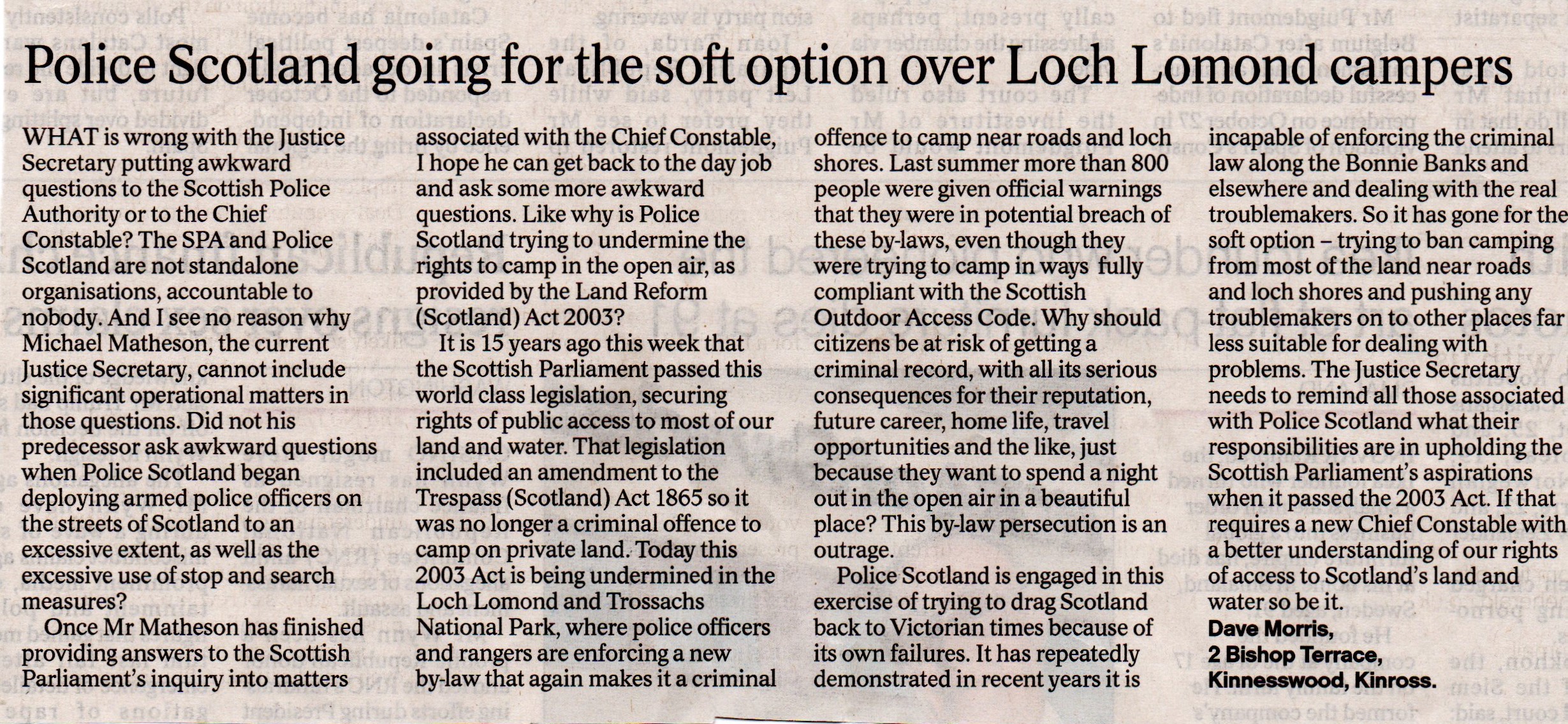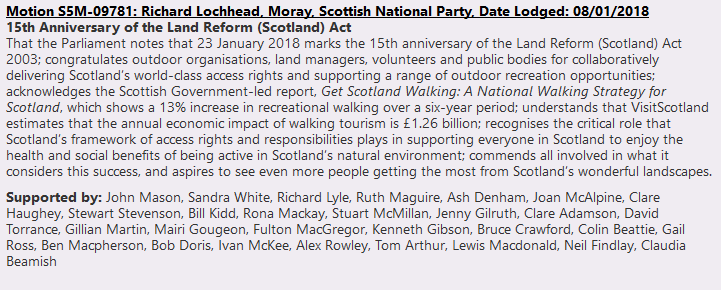
23rd January was the fifteenth anniversary of the passing of the Land Reform Act which enshrined access rights in laws. Behind the legislation was a recognition that any problem in the countryside which was associated with people taking access to land, from burgling houses to dogs being out of control and worrying sheep, was already covered by the criminal law.
I know this because I represented Mountaineering Scotland at the negotiations which took place with landowners at the then Access Forum – chaired by Magnus Magnusson – and asked their representatives to tell us about any problem landowners faced which could not be covered by the criminal law. They could not come up with a single example.
That is why the Land Reform Act did not introduce any new offences for people visiting the countryside – none were needed. That is also why the failures in policing in the Loch Lomond and Trossachs National Park (since former Chief Inspector Kevin Findlater retired and Police Scotland was created) should be a matter of concern for all who care about access rights (as explained by Dave Morris above) as well as to the communities that live there.
The illiberal and unjust camping byelaws
The Land Reform Act is a great piece of liberal legislation, in the best sense of that word, and was socially inclusive. It gives everyone access rights, from the Queen to the homeless, so long as these are exercised responsibly. The framework for that is set out in the Act as follows:
In determining whether access rights are exercised responsibly a person is to be presumed to be exercising access rights responsibly if they are exercised so as not to cause unreasonable interference with any of the rights (whether access rights, rights associated with the ownership of land or any others) of any other person,
Its worth considering how this relates to camping. Camp in the wrong place – right next door to a house or blocking a gate to a field – or for too long, and you would be interfering with the right to a landowner to enjoy or manage their property. Hold a party by your tents, causing disturbance or putting people in fear or alarm and you are interfering with the access rights of others and also probably committing the Criminal Offence of Breach of the Peace.
Our access legislation therefore in my view provides a great framework for addressing any issues that might be associated with camping. Its not just me that thinks this: in 2013 the Loch Lomond and Trossachs National Park Authority, led by their Convener Linda McKay, gave a presentation to the Land Reform Review Group set up by the Scottish Government to review the legislation proposing that road side camping should be removed from access rights. Copies of the presentation she gave – and therefore the arguments made – are mysteriously not held either in the archives of the LRRG or the Loch Lomond National Park Authority but we do know the LRRG firmly rejected these proposals. The LLTNPA then went off to develop in secret its own version of a ban using its byelaw making powers under the National Parks Act legislation which pre-dated the Land Reform Act.
The core problem with the camping byelaws is that they sacrifice the rights of the majority – whom even the LLTNPA acknowledge cause no major issues – in order to try and prevent problems caused by a small minority. The camping byelaws are thus fundamentally illiberal and undermine the entire framework developed by the Land Reform Act. Roseanna Cunningham, the Environment Minister and minister responsible for our National Parks, needs to add her voice to that of Dave Morris and call on Michael Matheson, the Justice Secretary, to ensure that proper policing is in place for rural areas. She could even call on him to meet with former Chief Inspector Kevin Findlater – who moved from supporting the camping byelaws to becoming their lead critic – on what resources would be required to provide effective policing in the National Park (accepting that crime rates in the National Park are much lower than in urban areas but also that problems when they do occur are relatively resource consuming because of the long distance between communities etc).
The role of the Scottish Parliament
To date the Scottish Parliament and our MSPs have taken very little interest in the camping byelaws. However, just this week (see here) the Scottish Parliament passed a first vote to repeal the Offensive Behaviour at Football and Threatening Communications Act 2011. Andy Wightman MSP described this as an illiberal piece of legislation – just like the camping byelaws then – and the parallels don’t stop there. Central to the arguments of James Kelly MSP, who has lead the campaign to repeal the Act, is that it unfairly targets football fans and the existing law is quite sufficient to address problems. The camping byelaws of course unfairly remove access rights just from campers (not from campervanners as originally proposed or from people who hold boozy barbecues on beaches) and there are lots of powers to deal with problems associated with the irresponsible minority (abandoning tents, chopping tree etc etc are all criminal offences).
James Kelly has also said there is no evidence that the Offensive Behaviour Act has had any positive impact. Exactly the same could be said for the camping byelaws where the LLTNPA are refusing to release information on the operation of the camping byelaws on the grounds its too early to tell and releasing such information could prejudice their enforcement (I will come back to this in another post).
The way forward that James Kelly identifies for tackling sectarianism, namely that the Scottish Government ” must work to unify parties, anti-sectarian organisations, faith groups and education leaders, and start taking the problem of sectarianism seriously” is my view, is the type of approach that should be adopted to address the problems associated with visitors to the National Park. Unfortunately, rather than involving the people who visit our National Parks, and working with the recreational organisations that represent them, the LLTNPA’s answer has been to ban everyone.
The LLTNPA of course are now claiming that the camping byelaws are less about irresponsible behaviour but more about numbers. That is also totally illiberal and contrary to what our access legislation was about and what better proof than this motion recently put to the Scottish Parliament:

“aspires to see more people getting the most from Scotland’s wonderful landscapes” – the exact opposite to what the LLTNPA is doing.
What needs to happen
Its time not just that the Minister for the Environment talks to the Minister of Justice about the important role that policing should have in ensuring access rights work as intended, but also that the Scottish Parliament starts to scrutinise what is going on in the Loch Lomond and Trossachs National Park Authority.
In order to prevent public authorities undermining the will of the Scottish Parliament in respect to access rights, the Scottish Parliament could usefully aim to make two changes to the way byelaws are created at present:
- The first is to repeal the provision in the National Parks Act, which preceded the Land Reform Act, to make byelaws controlling access and require that any byelaws controlling access should come under the provisions of the Land Reform Act. This is important because although there is a byelaw making power under the Land Reform Act this was only ever envisaged for very specific circumstances (e.g to prevent disturbance to nests of terns on beaches during the breeding season) and where other measures, such as advisory signs, were shown not to have worked.
- The second is that the Scottish Parliament should have the right to scutinise all proposals for camping byelaws put to the Minister of the Environment for approval. The Scottish Parliament should be demanding it has the right to hear evidence about the alleged success of the camping byelaws before any decision is made about their renewal.
Really interesting recap and good comparison with thinking elsewhere… Aren’t the bylaws up for review next year? Presumably the Authority will have a PR plan to address this… Is there any coordination between interested parties to ensure there will be an effective counter to this propaganda?
While the Minister told the LLTNPA they had to provide annual updates and a three year review, LLTNPA senior staff want the byelaws to remain permanently. The review of the east Loch Lomond byelaws was totally flawed and I submitted a detailed report on why it was so flawed which has never been responded to properly by the Scottish Government. The way things are currently in the LLTNPA there is no chance of their senior staff producing an objective report and the strategy for recreational organisations has to be to produce an alternative report for Ministers. LLTNPA staff fear this which is why at present they have refused to release much of the data and other information they hold about the operation of the byelaws. The good thing is nationally I understand recreational organisations are forming an umbrella group to discuss/take joint action on access issues, including the camping byelaws